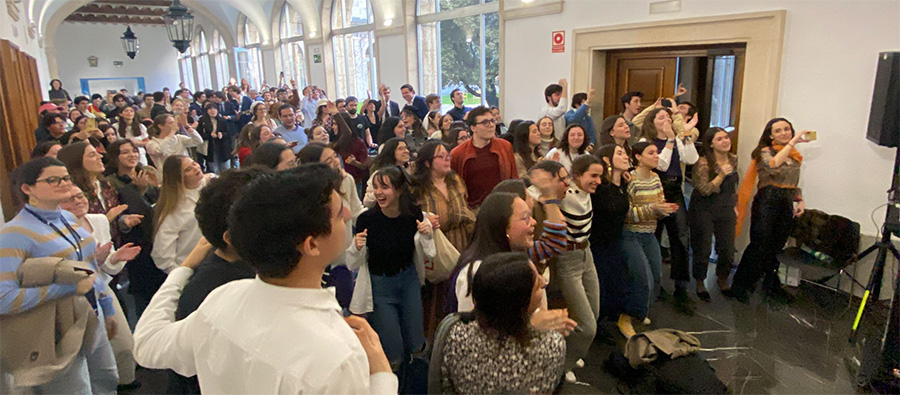See
Raffles, live music and gymkana were some of the activities that took place for the patron saint Day of the School of Philosophy and Letters. Students and professors gathered at the Central Building (headquarters of the School of Philosophy and Letters) of the University of Navarra. During the workshop, in addition to the aforementioned, we had the presence of Carmen Iglesias, director of the Royal Academy of History, and the writer Lorenzo Silva, who received the scholarship of Honor of the School.
All this was reported by Bárbara Arrieta, student of the double degree Degree in History and Journalism; Teresa Tabuenca, student of the double degree Degree in language and Spanish Literature; and Gabriel Pizarro, student of the double degree Degree in Philosophy and Journalism.
A day of approaching the patron saint
Saint Isidore was born in Seville, around the year 560. With his Historia Gothorum and his Etymologies, to mention only two of his most important works, he established himself as one of the wisest and most influential men of his time. During his years as archbishop of Seville, he advocated in favor of the cultural institutions of the Peninsula and promoted the promotion of the arts, sciences and law. In April 1722, he was declared Doctor of the Church by Pope Innocent XIII.
The content of his works endures to this day and has been the subject of study since their publication. As historians, philosophers and humanists, it is essential to know his work, since his faith has inspired Catholic believers for centuries. For all these reasons, we at the University of Navarra celebrate this with great pride .
After a few cold and cloudy weeks in Pamplona, February 15 was illuminated to welcome the celebration of the Day of the patron saint of the School of Philosophy and Letters. From ten o'clock in the morning until six o'clock in the evening, this workshop full of reflection, coexistence and rapprochement has been enjoyed. San Isidoro de Sevilla has been the protagonist on this day and, although it is usually celebrated in April, at the University of Navarra we have gone ahead so that everyone can enjoy the celebration. Thus, students, professors and staff of the School have joined together to commemorate his patron saint. In addition, we have had the honor of welcoming two guests during the academic act: Carmen Iglesias Cano and Lorenzo Silva.
The Day of the patron saint began at 10 am, with the solemn mass at the chapel of Amigos Building. The mass was celebrated by the chaplain of the School, Mr. Jon Borobia. At the end of the mass, the attendees enjoyed a snack to help them gather strength for the day.
Already in the Central Building (headquarters of the School of Philosophy and Letters) the academic act began. The table was presided over by Julia Pavón, Dean of the School of Philosophy y Letras; Dolores López, Vice-Dean of Students; and Carmen Iglesias, Director of the Royal Academy of History. Julia Pavón dedicated a few words to Saint Isidoro of Seville and his work in the promotion and cultivation of the Humanities. She then introduced the guest speaker, who gave both students and teachers a magnificent lecture under the title degree scroll "History and language. On truth and lies". During the colloquium, the director of the Royal Academy of History made an exhaustive review of the different uses that truth and lies have had in the field of Humanities. As the professor stated, "the eradication of the Humanities in the Education extinguishes critical thinking; on the contrary, the knowledge of history protects from manipulation and from Manichaeism". Finally, the professor highlighted the work of humanists in telling the truth:
"Narrative has the capacity to modify the perception of historical facts, it can even affect the ethical inclination and destroy what unites us." These words connect with the idea that the illustrious guest commented on the danger of "unscrupulously using falsified historical narratives".
During the workshop, the extraordinary awards were presented to the students who graduated during the course 2021-22. In the Degree of History the winner was Irene Ramirez, who was in charge of making a speech on behalf of the winners. In Philosophy, Blanca Bistué; in Philology, Uxue Sarobe; in Humanities, Isabel Latasa; in Literature and Creative Writing (LEC), Borja Hernández and, finally, in Philosophy, Politics and Economics (PPE), Mario Tamayo. In addition, Sergio Navarro received theextraordinary prize from doctorate at Arts and Humanities.
To conclude the academic ceremony, the scholarship of honor of the School of Philosophy y Letras was awarded to the writer from Madrid Lorenzo Silva, award Planeta 2012. During his speech he expressed his gratitude for the recognition of the School and encouraged students and professors to be "real places".
Once the morning's events were over, lunch was served, which many enjoyed outdoors. There were points of sale for solidarity or funding for programs of study trips and the students had the opportunity to talk with teachers from different Departments. For Aitor Blanco, department teacher at Philology, it was "a day of getting to know each other".
Likewise, the 3rd and 4th grade students of Degree of History took advantage of the day to dress up as historical characters, such as Scipio or Philip II.
Javier Andreu, director of department of History, declared that the Day of patron saint is very special because "it is born from the students and revolves around their concerns". That is why they were the protagonists of the Talent Show, in which they demonstrated their talents and announced their own solidarity and sports initiatives.
Throughout the afternoon, there were poetry recitals, a musical version of a Lorca poem and songs by Coldplay, the Beatles or El Canto del Loco, which the students sang in unison. Emotion also reigned when Almudena Uclés and Izaro Díaz, delegate and subdelegate of the School and main organizers of the workshop, conducted a raffle of lots of books generously donated by the teachers. The show closed with the song "Tenía tanto que darte" (I had so much to give you), sung by a group of students from 1st of Philosophy and with some nice words of thanks from the Dean, Julia Pavón, and the Vice-Dean of Students, Dolores López. As the sun began to set, the day concluded with a Gymkana in which the youngest students went around the campus solving puzzles or chess games.
At final, the Day of the patron saint of the School of Philosophy and Letters is a unique celebration because, as Pablo Pérez, Full Professor of Contemporary History, said, "we understand the meaning of the celebration, where its history comes from and how it should be expressed". We certainly agree with his words.

Sources consulted
Laus Hispaniae. In praise of Spain. LAUS HISPANIAE: journal of Spanish history.
Monday, April 26, Feast of St. Isidore of Seville. Archdiocese of Seville.
If you liked the article, you might be interested in one of our Degrees!









